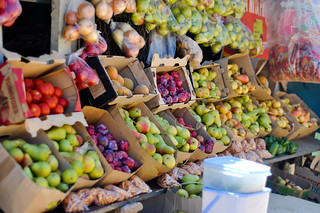African Recipes Sound Good But How Do You Cook Them
Pumpkin Leaf Stew, Taro Root Tomato Stew, and Cocoyam Vegetable Soup sound good, but how do you cook them.
Have you ever stood and stared at a new vegetable produce from the international foods section of your local supermarket and how to cook it? In recent years, many exotic-sounding products have been introduced on the shelves of supermarkets in the United States. As a result, Americans have found out about food items like pumpkin leaf, taro, and cocoyam, and many are curious to try the newly found items. Many foods are unknown outside places of origin, and introducing new foods helps open up international fair trade markets.Pumpkin Leaf Stew Recipe

Cooking in Igboland means cooking with vegetable bulbs as well as the leaves of the plant. Fluted pumpkins are used in many traditional recipes across Igboland.
Ingredients
1 medium pumpkin, peeled, cubed, deseeded
3 handfuls pumpkin leaves, chopped
2 large carrots, peeled and sliced
2 white potatoes, peeled and quartered
1 medium onion, sliced
2 stalks celery, diced
2 ripe large tomatoes, diced
Salt and black pepper to taste
1 tablespoon palm oil or vegetable oil
3 cups vegetable broth or water
Directions
Heat oil in a large pot over medium heat; add all ingredients. Simmer until potatoes are tender, about 15 to 20 minutes. Serve over rice or as a stew.
Taro Root Tomato Stew Recipe
Taro Root is a staple crop used in many African, Asian, Caribbean, and Hawaiian recipes. Taro Root Tomato Stew is an easy one-dish recipe made throughout Africa. Pottage is a thick soup or stew and taro root is a starchy vegetable consisting of 2/3 water with a fibrous outer coating. Taro root is commonly used in place of a potato however, Taro root and leaves should not be eaten raw.
Ingredients
2 taro roots
2 handfuls cleaned taro leaves, chopped finely
1 medium onion, finely chopped
2 medium ripe tomatoes, diced
2 tablespoons palm oil
Salt and pepper to taste
2 cups vegetable broth
Directions
Wash taro root boil with skin in salted water until soft. Drain, peel and cut into pieces. Wash chopped taro leaves and stems boil 5 minutes and drain. In a medium frying pan add palm oil and sauté onions with seasonings; add taro root, leaves, broth and tomatoes simmer 15 minutes. Serve over rice.
Cocoyam Vegetable Soup Recipe

Where yam is King of crops, African cocoyams are often associated with peasant crops; cocoyam is considered a poor man’s crop or a woman’s crop. Women are the cultivators of cocoyam farming in most African countries, thus improving cocoyam production should have a direct impact on the most economically vulnerable groups. Cocoyam, if eaten raw, the calcium oxalate crystals causes a stinging feeling to the mouth and throat; cocoyam must be cooked before being eaten.
Ingredients
1 large cocoyam root peeled and diced
3 large tomatoes, diced
2 handfuls bitter leaf or kale
2 medium chopped onions
1 medium chopped red bell pepper
1 medium chopped green bell pepper
1 teaspoon allspice
½ teaspoon ground ginger
1 teaspoon tamarind paste
2 teaspoons red pepper flakes
1 teaspoon minced garlic
2 cups vegetable stock
Directions
Add all ingredients to a large pot, simmer until thick 25 minutes. Serve warm with rice.
































